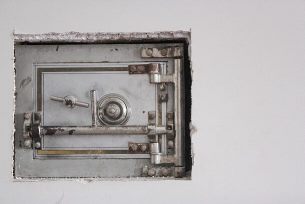What to Consider Before Using a Safe Deposit Box for Your Last Will and Testament

Last Will
Securing your estate planning documents like a Will or Trust is a good idea, but storing them in a safe deposit box at the bank may have unintended consequences. This article presents some common issues that occur when using a safe deposit box for your important documents.

A safe deposit box is a secure container that is often stored inside of a vault at a bank. You can go to the bank and pay to rent the safe deposit box to store important documents and other valuable property. Safe deposit boxes are seen as providing security for the contents from being stolen or damaged by fire or water. This is why you may consider using a safe deposit box to store your Will, to ensure that it is protected from theft or other damage.
1. Does Anyone Know That You Stored Your Estate Plan in the Safe Deposit Box?
If no one knows that you have secured your Will or Trust in a safe deposit box at your bank, they will not know to look for it after you pass away. Likely your purpose in storing the documents in the deposit box is to keep them safe. If the documents are safe but no one knows that the documents exist or where they are located, that may prevent the use of your Will to convey your property.
Although your documents will be secure, if only you and the bank know about the deposit box, having kept the documents safe may not matter. Similarly, if no one knows that the Will is in the deposit box, the court may proceed with the distribution of your assets and property intestate through the probate process. Many people want to avoid the probate process if possible and that is one reason that they have a Will.
It is also important to share the specific information about the safe deposit box. It is not going to help if someone knows that you have a safe deposit box somewhere in the state. There are thousands of banks where that deposit box could be. It would be most effective to tell them at least the bank location that the safe deposit box is at, if not also the identifying number to the box.
2. If They Know About the Safe Deposit Box, Do They Have Access to it?
Another problem that occurs when using this option is when you tell someone that your Will is in the safe deposit box, but they do not have access to it. This can be problematic if the court process for distributing your assets has begun but your Will is inaccessible.
For example, in Florida, your personal representative is authorized to access it by presenting the death certificate of the owner and documents from the court that appointed them as the personal representative. In order to be appointed as the Personal Representative in a case where there is a Will, the Will needs to be filed with the court. This is complicated if the Will needed to appoint a Personal Representative is locked away in a box that can only be accessed after the Personal Representative is appointed. This may lead to someone being appointed Personal Representative who was not the person you appointed in your Will because the court will not know who you appointed until it has your Will.
Florida law provides a way for certain individuals to gain access to safe deposit boxes in order to obtain a Will of the decedent, any documentation related to a burial plot or burial instructions, and an insurance policy on the life of the decedent. Florida Statutes section 655.935 permits only the person named in a court order, or if there is no order, the spouse, parent, adult descendant, or personal representative of the decedent, to access the safe deposit box. Regardless of the individual’s relationship to the decedent, they must present proof of the death of the lessee of the safe deposit box. The examination by the individual must be done in the presence of an officer of the lessor. Any documents to be removed by the individual will be copied by the lessor and a record of who removed the documents will be stored in the safe deposit box.
Safe deposit boxes can be a useful way to keep your documents and property safe; however, it is essential that at the very least someone knows that your documents are stored in the deposit box. The best option would be to have someone else whom you trust listed as having access to it so that they can access your will after you pass away.
3. What About Storing My Documents in My Safe at Home?
The same considerations for a safe deposit box apply to a safe that you have in your home. Many people keep a safe in their home for the purpose of protecting their important documents and valuables. While it is more manageable to gain entry to a safe than a safe deposit box at the bank, it would still be best if you communicate with someone about the safe. At the very least, it would be helpful to let someone you trust know that you are storing your estate plan in the safe for safekeeping.
While you understandably want to make sure that your Estate Plan is safe and protected, you do not want to undermine the effectiveness of the documents by preventing them from being used to distribute your assets. If you choose to store your important documents in a safe deposit box, be sure to tell a trusted friend, family member, or attorney where your documents are located.
To learn more about creating an estate plan or to help you through the Florida probate process, please give Stivers Law a call at 305-456-3255.



